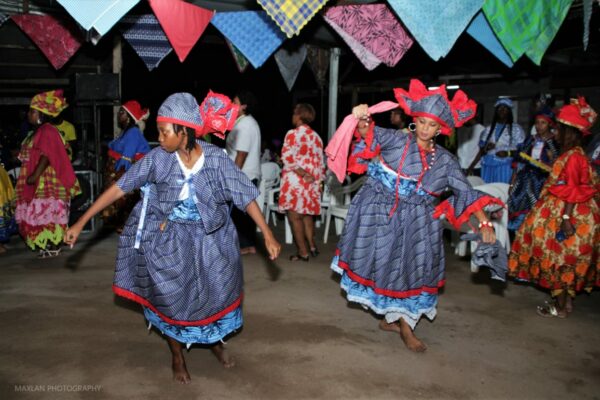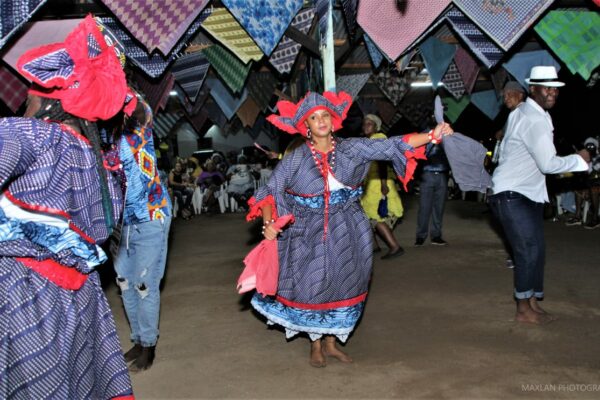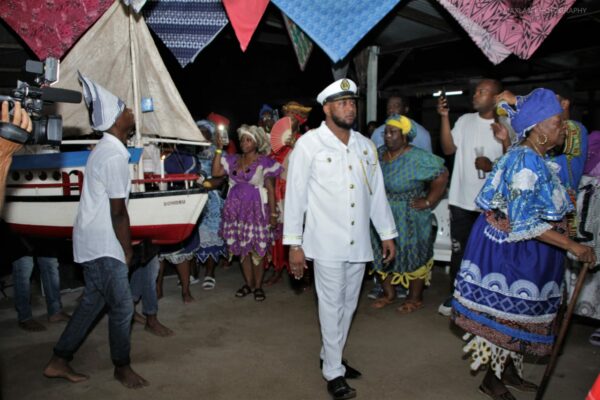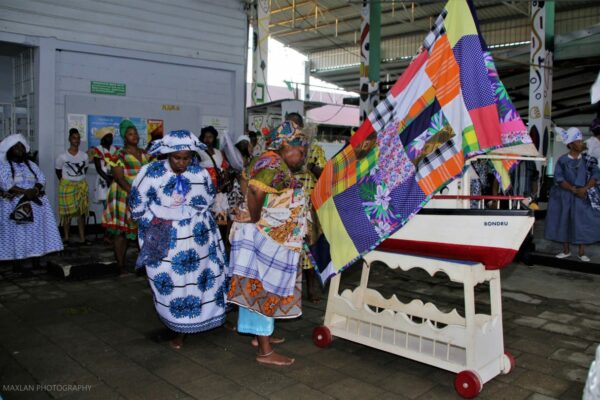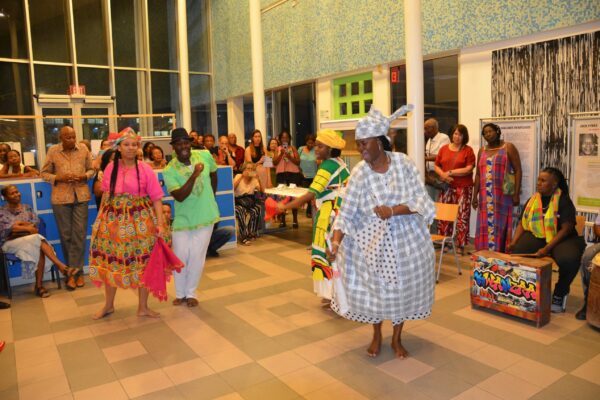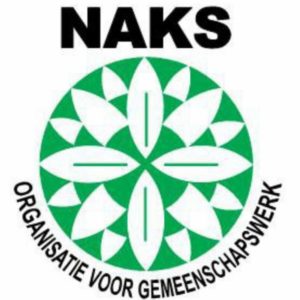 OUR MESSAGE
OUR MESSAGE
ICH NGO NAKS SURINAME
The year 2023 marks the 20th anniversary of the UNESCO Convention for the Safeguarding of the Intangible Cultural Heritage. We are so excited to be joining in on the Celebrating of 20 years of safeguarding living heritage.
So, here is our message in which we reflect on the road traveled and the way forward.
We as an NGO came from a long way. It is with great pride that we announce this year also to be marking 2 major anniversaries in our country, Suriname. The first is the 75th anniversary of our NGO NAKS Suriname as one of the oldest NGOs. The celebration of our anniversary started last year in May. The 2nd anniversary is 150 years of the Abolition of slavery in our country. We took the opportunity to combine our anniversary events with the celebration of the convention’s 20th anniversary. Our anniversary events included highlighting ICH placed on our agenda to execute thorough research for safeguarding purposes. The focus is the safeguarding of the cultural elements of the Afro-Surinamese culture in Suriname and the Afro-Surinamese diaspora in the Caribbean and in the Netherlands.
We see our role as a member of the ICH NGO Forum as one that should be contributory towards the establishment of strong alliances with partner ICH NGOs in the Latin American and Caribbean region. Therefore, we actively seek collaborations with NGOs with shared cultural elements so we can establish joint nominations for inscriptions on the Representative list of the ICH.
As we make our way forward in the implementation of the convention, it is pivotal to address a couple of challenges that we encounter along the way. The ability to empower and equip our communities with knowledge and skills so they are capable of properly meeting the requirements as outlined in the nomination procedures has become paramount. This is one of the main and most important challenges that we as a collective of ICH NGOs in the Latin American and Caribbean region have been addressing over the course of several Capacity building workshops. In our personal case as an NGO, we still face the issue of successive governments who have failed to implement the existence of a National Inventory of ICH elements in Suriname. Without the National Inventory we remain limited in our ability to nominate ICH elements for inscription on the ICH Representative list. Yet, we refuse to give in, and instead continue to work diligently on further developing our inventory of Afro-Surinamese ICH in Suriname. From 2015 until now our NGO identified more than 70 Afro-Surinamese ICH in need of safeguarding, of which at least 25 need urgent safeguarding.
To address our hopes in the grand scale of the convention we are looking forward to the following:
- That in the next 20 years there will be particular attention to policies being developed that would lead to an increase in the respect for the intangible cultural heritage of our communities, in Suriname and in general in our region. Too often we are being confronted with a lack of sufficient policies being put in place to protect the intellectual properties related to ICH of our communities. Communities and individuals are being exploited and sometimes even neglected by third parties for the sole purpose of commercializing the cultural elements.
Recent developments with regards to disrespecting regulations for the safeguarding of one of our national heritage sites listed on the World Heritage list have evoked major debates and heated discussions in our community in Suriname. The site is closely associated with some of our identified Afro-Surinamese and Indigenous ICH. By submitting an open letter and a petition to the Minister of Education, Science and Culture in Suriname, our NGO pleaded for a negotiable approach from the Government towards the different stakeholders. This case remains to be current and therefore, we would like to request for urgent measures to raise awareness at the local, national, and international levels of the importance of the intangible cultural heritage, for the ensuring of mutual appreciation thereof. Even though the discussions were related to Tangible heritage, it would indirectly affect the safeguarding of ICH associated with this Hence our decision to publicly engage in the ongoing discussions to demand the Government to adhere to the regulations attached to national heritage sites. - We consider the role of the NGOs to be inextricably connected to the existence of the Representative list of ICH and the Urgent safeguarding list for the next 20 years. Therefore, we want to advocate for the NGOs as part of the ICH NGO Forum to be exposed to accessible and for their region’s relevant tools, and even proper technology such as internet connections, so they can actively and efficiently partake in events organized by the forum, but also contribute towards supporting their communities to comply to all measures and requirements in the process of preparing for the nomination of an ICH element to be inscribed on one of the safeguarding lists. Our communities and NGOs suffer from the lack of equipment, manpower, and relevant skills and as such too often we as NGOs miss opportunities to succeed in the promoting and safeguarding of the ICHs that are dear to our communities.
Throughout our existence as the only accredited NGO in Suriname we managed to book great successes. Some of our accomplishments include:
- Written advice provided to our government about the juridical process to have the national inventory established.
- Written advice provided to our government about the spelling of Sranantongo, the native language of the Afro-Surinamese. Based on the advice the government decided to collaborate with our organization and organized three webinars in 2023 to address the correct spelling of the language. The outcome of the webinars should result in the announcement of a new Spelling national resolution.
- Through our NAKS Documentation Centre for Afro-Surinamese Culture, we are continuously gathering and digitizing information on 7 cultural elements, i.e. traditional clothing and ornaments; traditional crafting; traditional music-dance-theater-storytelling; traditional religion and rituals; traditional languages; traditional medicine and traditional culinary. All of these ICH are related to our history of slavery and the way in which it has shaped our current identity as a community and the practice of our traditions.
- We annually (since 2018) present 12 Surinamese national icons, linking them to ICH and invite hundreds of youths to participate in the related exhibitions.
- Through our NAKS divisions and commissions we regularly, at least monthly, organize theater productions, seminars, conferences, youth activities, youth discussions, community activities, radio- and TV productions. All inspired by the identified ICH of the Afro-Surinamese culture and with the purpose of creating awareness about the value of safeguarding and continuing our ICH.
- As of last year, 2022, we were offered a section in one of the well-read newspapers in Suriname. We use this space in the newspaper to publish once a month articles about ICH and challenges related to the safeguarding of these.
- One of our major successes was the organizing of a series of Banya activities from the 2nd of May 2023 until the 23rd of June 2023. A typical Afro-Surinamese music- and dance style performed in honor of the ancestors. It is a social dance- and music style invented by the enslaved in Suriname and performed on the plantations. The Banya is part of the immaterial cultural heritage of the Afro-Surinamese people. It contains a rich array of traditional knowledge and ritual practices. The dance and associated music started off as a social dance, and throughout the years these also became part of religious activities. Currently, NAKS aims to safeguard this traditional dance, music and associated DU theater performance by organizing an annual Prisiri Banya dance event. This year, the Prisiri Banya has been celebrated as part of the activities to highlight the 75th anniversary of NAKS, commemoration of 150th years abolition of slavery, and the 20th anniversary of the convention for the safeguarding of the ICH. NAKS has committed to employing research and data collection in collaboration with the Afro-Surinamese community and the bearers of this ICH knowledge to secure continuation and preservation of this ICH. The series of activities started with a seminar, followed by a workshop, and closed off with a festival. During the seminar and the workshops participants learned about the historical background, the role and development of the Banya dance, the basic dance moves, the songs, and the meaning of the songs. Participants also received insight into the transformation from the Banya being a social dance style to it becoming a religious dance style.
During the festival members of NAKS Wan Rutu showcased the relevant ritual performances related to the Banya dance, and the traditional wear, typical to the dance style. The Prisiri Banya event with the theme being a Boto Banya was the highlight of the celebrations. It was performed in the period leading up to the celebration of 150 years of abolition of slavery in Suriname.
From our inventory we now have selected 10 ICH related to Afro-Surinamese dance and music styles. These are the banya, bazuinkoor, drageman, kanga, kaseko, kawina, lobisingi, setdansi, sokopsalm and susa. The goal is to work closely with the communities and bearers of the knowledge and skills and gather all the necessary information to prepare safeguarding activities. This project is spread over a period of five years with the hopes that by then the National inventory would have been established.
In the next 10 years in the framework of the Convention we will seek to strengthen our position in the ICH NGO Forum, become more visible, actively contribute towards the development of policies and measurements to strengthen our capacities as NGOs, and ultimately continue to advocate for the evolving of the visibility of our NGOs in the Latin American and Caribbean region. Our motto is ‘Eenheid maakt macht’, which means ‘Unified we are capable to achieve more’.
The pictures included in our message illustrate the vibrancy of our series of activities as described. Our aims are to continue to work diligently on the identifying of ICH, strengthening of our communities, and ultimately work in close collaboration with the bearers of the ICH knowledge on the preparing of several nomination files for the inscribing of Afro-Surinamese ICH on the safeguarding list.
Members of Naks Wan Rutu perform the Banya dance style. Both are dressed in the appropriate traditional wear. The dance moves are performed by making backwards movements with the feet while holding two folded headkerchiefs in each hand.
Welcoming and preparing the boat for the performance of the Boto Banya. The boat is being guided by the captain (which is a symbolic role) to the tent where it will become part of the ritual performances. The boat symbolises the journey of the ancestors who were enslaved and transported to Suriname as part of the Transatlantic slave trade. The Boto Banya is performed in honour of the ancestors.
Members of Naks Wan Rutu performing the Banya dance during the Banya as part of one of the educational activities to showcase this authentic traditional Afro-Surinamese dance style.

